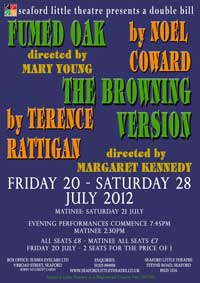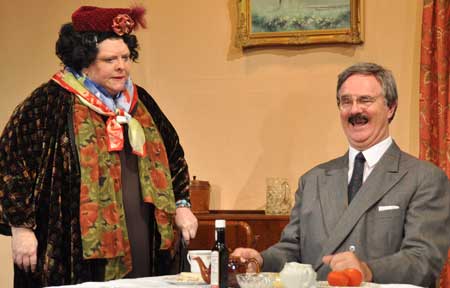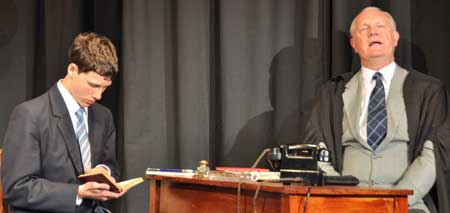fumed oak by noel coward
the browning version by terence rattigan

- FUMED OAK
- Henry Gow
- Doris Gow (His Wife)
- Elsie Gow (His Daughter) Mrs Rockett
- THE BROWNING VERSION
John Taplow - Frank Hunter
- Millie Crocker-Harris
- Andrew Crocker-Harris
- Dr Frobisher
- Mr Gilbert
- Mrs Gilbert
- Dir - FUMED OAK
- Dir - BROWNING VERSION
- SM - FUMED OAK
- SM - BROWNING VERSION
- Lighting Design
- Lighting & Sound
- Continuity
- Set design
- S
- wardrobe
- programme/Poster design
- CAST
Tony Bannister
Cathryn Parker
Roxanne Lloyd
Josie Hobbs
CAST
Owen Daughtery - Damian Sutton
- Sylvia Aston
- Tony Bannister
- John Hamilton
Chris Church - Sarah Chapman
- Mary Young
- Margaret Kennedy
- Gill Watson
- David & Rosina Heathcote
- Gary English
- Ian Baldwin
- Penny Cockell
- Margaret Kennedy & Mary Young
- Joan Holstead
- alan lade

Fumed Oak Photo Album
click here to view

The Browning Version Photo Album
click here to view
SEAFORD GAZETTE Review by Derek Watts
The summer offering at Seaford Little Theatre last week was a judicious double bill of one act plays by two of Britain’s most celebrated playwrights of the 20th century. The interesting feature was that while one of the pieces – Terence Rattigan’s ‘Browning Version’, directed by Margaret Kennedy, is a widely-known and much-loved classic, Noel Coward’s ‘Fumed Oak’, directed by Mary Young, is an almost undiscovered work – as the Master termed it, ‘a nasty little comedy’.
The evening belonged to Tony Bannister. This experienced and accomplished performer showed his versatility in his portrayal of the repressed, disillusioned academic Crocker-Harris in the Rattigan and then the equally repressed but determined hen-pecked husband who makes his bid for freedom in the Coward comedy. Both plays – and indeed both roles – are in a sense about loss, of promises unfulfilled, of dreams hardly dreamed, let alone grasped. As the Classics master, Bannister was buttoned-up and precise, in his delivery and gait, and his breakdown after the present of the ‘Browning version’ from his pupil Taplow was moving and heartfelt. Owen Daughtery, whom I saw last year in a fine performance at Lewes in the Youth Theatre production of ‘Two’, was just right as the diffident yet cheeky schoolboy, who fears and loves in equal measure the man who had moved from a figure of fun to one of derision. Crocker-Harris is due to leave the school after many years’ service, yet is denied a pension by the governors. This devastating news is conveyed to him by the dry and rather weak Headmaster, Frobisher, played with a nice sense of formality by John Hamilton.
Crocker-Harris accepts the news as being the way things are but for his shrew of a wife, Millie, played with an elegant bitchiness by Sylvia Aston, it is the last straw. She’s been carrying on with Crocker-Harris’ colleague Frank Hunter and, so it seems, has done the rounds of the Common Room. The affair means nothing to him and little to her, except as an antidote to the boredom and aridity of her marriage. As the lover, Damian Sutton brought an earnest and almost principled demeanour to the role. Chris Church had few opportunities to impress as Crocker-Harris’ successor and Samantha Chapman as his wife had even fewer.
From the modulated vowels of the Classic scholar to the flattened glottal stops of south London, Bannister gave Henry Gow full rein as he launched into his tirade against his wife [played with a dogged nastiness by Cathryn Parker], his daughter, played by Roxanne Lloyd in a snivelling epitome of the whining teenager, curled lip and all, and his mother-in-law, to which Josie Hobbs brought a malevolent touchiness. After a quiet breakfast, Henry stops off for a couple of whiskies on the way home from work and his wife’s nagging cracks the dam and years of pent-up resentment pour out as Bannister lays about him and sweeps out of the house to a new life. With his torrent of emotion and bitterness, the sense of the wasted years was, as for Crocker-Harris in a very different milieu, palpable.
All in all, two interesting plays, two fine central performances and a reminder that the well-written one-act play still has much to offer.
SEAFORD SCENE The Browning Version Review by Fran Tegg
A high-class production of Terrence Rattigan's 'The Browning Version' was performed at Seaford Little Theatre from 19th to 27th July. With excellent direction by Margaret Kennedy this short play, set in an English public school, revolves around retiring classics schoolmaster, Crocker-Harris, known as 'The Crock', and described by the schoolboys as the 'Himmler of the Lower Fifth'; a marvellous portrayal by Tony Bannister.
Constant humiliation by the pupils and disregard by his wife, (played wonderfully by Sylvia Aston),has resulted in a pent up, emotionless Crocker-Harris. However when punished school boy Taplow; excellently played by Owen Daughtery, who in an unexpected act of kindness, gives the schoolmaster a copy of Robert Browning's translation of Aeschylus's Agamemnon', as a leaving present. Crocker-Harris is touched and moved by the words that Taplow has written inside the book Unable to hold back the tears, Crocker-Harris breaks down, revealing a surprisingly sensitive side to his character, in a tear-jerking performance.
However, through misunderstanding, Crocker-Harris quickly recovers from his emotions and when his philandering wife explains that she has been having an affair with the young science teacher (Damian Sutton), she and the audience are surprised to discover that Crocker-Harris had known this all along.
Fine performances also by John Hamilton as Dr Frobisher, Chris Church as Mr Gilbert and Samantha Chapman as Mrs Gilbert. Credit must also be given for the excellent set design anld production.
Fumed Oak Review by Gerrie Purcell
The receptive audience were not disappointed with the second instalment of the evening. An enjoyable two act play by Noel Coward that packed a punch - a slap in factl I say enjoyab!e, as the audience responded with howls of welldeserved laughter to the well-timed delivery of Coward's witticisms but it is an unpleasant comedy.
'Fumed Oak' is certainty non-PC, with Coward's wit sharpened into what could be seen as spiteful misogynistic claws. But it is an insightful vision into an unhappy family life: in middle-class pre-war Engtand. The audience could also delight in the 'worm that turned' storyline.
It takes comic-skill to barely utter a sound, let alone a word in the first Act and still manage to raise wry laughter from the audience, but Tony Bannister's 'Henry Gow' is the said 'worm that turns' hero. Every long-suffering silent mannerism at the breakfast table was played with precision against the domineering posturing of formidable wife 'Doris Gow', portrayed by Cathryn Parker with impressive timing.
Cathryn squeezed out every titter from the audience Coward intended from his bitchy, gossipy lines. From tetchy banter between her and her mother, 'Mrs Rockett' played with assuredness by Josie Hobbs, and her impatient swipes directed at her sniveling daughter; Roxanne Lloyd's 'Elsie', it was clear that Doris Gow was used to ruling the roost and fully intended it to stay that way. Roxanne presented the role of the charmless, whining schoolgirl with confidence and certainly conveyed that 'Elsie: was well on the way to become a copycat of her mother and grandmother.
Simple, effective staging and Mary Young's tight direction ensured the well rehearsed exchanges kept up the pace, and the energy was palpable when the second Act heralded the end of their co-habiting existence. Dinner-time that same day saw Henry suitably imbibed enough to announce his secret well-planned escape.
Roars of laughter from the audience greeted the moment Henry cast his unpalatable plate of cold ham on the floor. But some stifled gasps met Henry's slap to Mrs Rockett's incredulous face - stopping her scathing commentary on Henry's behaviour. The audience were gripped by the crackle of tension between the two actors.
Henry now took to the floor and with fiat-toned but barbed comments made clean incisions into the rotten flesh o f their lives. Pronouncing his dreams of travelling the world and not tolerating the fumed-oak furniture and cold-ham existence that God had been punishing him with for fifteen years! His secret stash of savings allowed him to leave Doris with £50 and her bullying and cheating ways to manage on while he went anywhere he chose with over £500.
He held out a little
hope for Elsie but the audience appreciated it wasn't much,
with the final quip as he dashed for the door that foremost she needed to get her adenoids fixed.